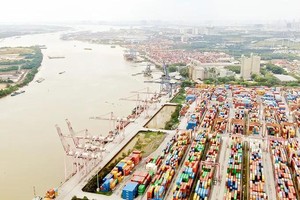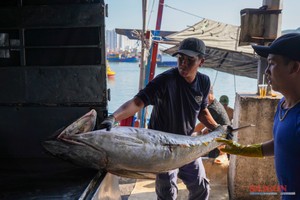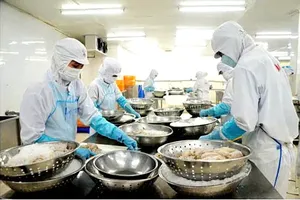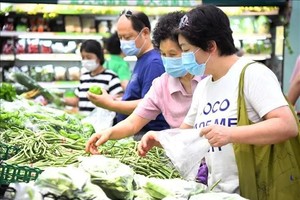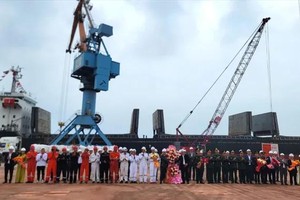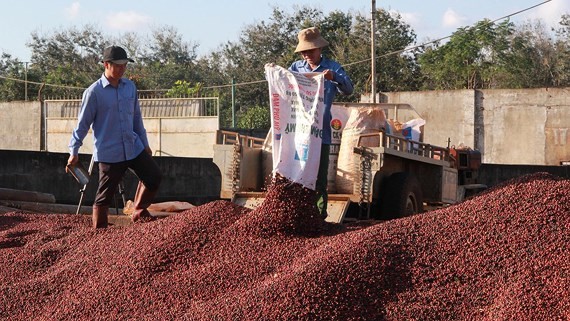
The current price of coffee bean fluctuated at VND31,000-VND31,100 per kilogram, a decrease of VND2,000 per kilogram compared to that in the beginning of this year.
According to Mr. Trinh Duc Minh, chairman of the Buon Ma Thuot Coffee Association, total coffee production in the world was around 9.6-9.7 million tons in previous years. However, in the 2017-2018 crop, global coffee production jumped to 10.3 million tons, leading to overproduction. Of which, coffee production of Brazil rose 7 percent compared to the previous crop. As supply exceeded demand, the price of coffee fell heavily. This is the general situation of global coffee industry.
According to Mr. Trinh Duc Minh, chairman of the Buon Ma Thuot Coffee Association, total coffee production in the world was around 9.6-9.7 million tons in previous years. However, in the 2017-2018 crop, global coffee production jumped to 10.3 million tons, leading to overproduction. Of which, coffee production of Brazil rose 7 percent compared to the previous crop. As supply exceeded demand, the price of coffee fell heavily. This is the general situation of global coffee industry.
Because coffee price plummeted, several farmers are forced to hold their coffee in stock to wait for the price to rebound.
Mr. Mai Hung, a farmer in Quang Tien Commune in Dak Lak Province’s Cu M’gar District, has to store 7 tons of coffee bean collected from his three-hectare-coffee plantation in the last crop.
At the time of harvest, the price of coffee bean was above VND33,000 per kilogram. As the price was not enough for him to cover initial investment costs so he stored his coffee in the warehouse and waited for the price to go up. He has just borrowed only VND200 million in order to invest in the next crop. As the price of coffee bean unexpectedly declined to VND31,000 per kilogram, he has to continue storing his coffee.
Mr. Pham Quang Muoi, head of the Department of Agriculture and Rural Development of Cu M’gar District, said that at the current moment, 90 percent of coffee growing households in the district owe banks money. Because the price was too low, farmers refused to sell their coffee. Therefore, they borrowed banks money for daily expenses and reinvestment. If the price continues to maintain at low level, many farmers will not able to pay their debts.
According to Mrs. Nguyen Thi Binh, deputy head of the Department of Cultivation and Plant Protection of Dak Lak Province, there are around 204,000 hectares of coffee in the province. In the last crop, total coffee production of the province was estimated to reach 435,000 tons. However, due to low price, farmers declined to sell coffee. It is estimated that the amount of coffee stockpiled by farmers accounts for 40-50 percent of total coffee production.
As low price prompted farmers to keep their coffee, several coffee dealers and companies could not buy enough the quantity of coffee they need.
Mr. Nguyen Xuan Loi, director of An Thai Coffee Company in Buon Ma Thuot City, said that coffee suppliers of his company faced difficulties in buying as farmers were reluctant to sell coffee due to low price, causing a shortage in input material so his company had to offer higher price than market price in order to ensure supply for its signed contracts.
Mr. Nguyen Hoai Duong, head of the Department of Agriculture and Rural Development of Dak Lak Province, said that when the price of coffee went down, both farmers and firms faced difficulties. Therefore, the provincial agriculture has had several policies to support coffee farmers, including seedlings, cultivation model, loans and projects.
At the current moment, coffee farmers should follow the project, approved by the provincial People’s Committee, to reorganize production by establishing groups or cooperatives to form stable material areas and connect with firms to ensure consumption. They should reduce input costs, such as fertilizer, water and plant protection drugs. The structure of plants in unsuitable areas should be changed under guidance of experts. In addition, they should apply high technology into farming, such as smart watering system.
Meanwhile, according to Mr. Nguyen Van Hop, head of the Department of Agriculture and Rural Development of Chu Se District in Gia Lai Province, although the price of coffee is low, basically, coffee remains the crop with stable consumption as firms have demand to buy coffee for export. Therefore, the department suggested farmers to apply organic farming and cut investment costs amid the current situation. If coffee trees are newly grown, farmers should intercrop fruit trees or fast-growing crops in their coffee plantations to increase income.
Dr. Tran Vinh, deputy head of the Central Highlands Agriculture and Forestry Science Institute, said that depending on the condition of soil in each area, farmers should choose plants that are in high demand for intercropping in order to make up for the losses caused by coffee at the present. Besides, they should choose coffee varieties that give high productivity and have good resistance to diseases and pests. In addition, farmers should apply organic farming to reduce costs for fertilizer and plant protection drugs.
Furthermore, they should study about agricultural knowledge and apply advanced technology to lower labor cost and save fertilizer but still get high yield. Authorities should guide farmers to develop specialty coffee, attract investors and increase further processing to raise the product value.
